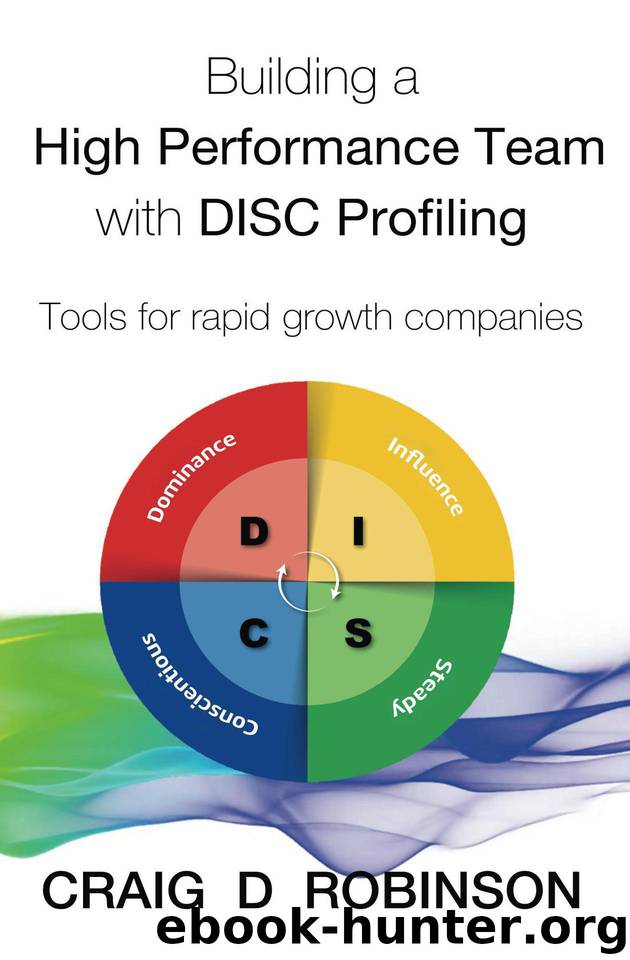Building a High Performance Team with DISC Profiling: Tools for Rapid Growth Companies by Robinson Craig

Author:Robinson, Craig [Robinson, Craig]
Language: eng
Format: epub
Publisher: UNKNOWN
Published: 2017-09-04T16:00:00+00:00
Chapter 5 – The Environment
Take a look at the work environment you're in right now. Is it hectic or comfortable? Is it organised or chaotic? Does it seem inviting? Maybe it's in a transitional period and you have no idea what's coming next.
As great as it can be for individuals to work together, there are often problems that come about when we try to get staff members to work in close association, especially for extended periods or during times of stress or change. It is never easy for people to work together, they are unique and different. The changes in an environment are a proof of this.
People will react to their environments in many ways. Some feel more controlled while others aren't so sure. Some are afraid of changes in their working
environment.
The DISC test exists to ensure that people can be matched with one another in a logical manner. That is, people who work well with each other in a similar or complementary style.
This helps to maintain a healthy working environment. It also allows all team members to be fully aware of what everyone is doing.
Part of the DISC test entails understanding how people work within their environments. Some people are much more confident about their environments than others.
Every group needs to have people who can keep things in check. The environment must be positive and comfortable to the point where no one will be afraid of what might happen.
The most useful thing about the DISC test is that it focuses on how people respond. It's about what people do in a variety of situations.
Some people will be far more aware of office tension or stress than others. Some will experience stress triggers more quickly or easily than others. Every person perceives the environment in a unique way.
Power Over the Environment
The amount of power that someone has over their environment can be a big influence on how they behave. Power can involve control over attitudes as well as tasks in the workplace. These directly influence how people act and react at work.
Power relates to control and keeping yourself from harm. It can even mean getting your way over everyone else.
Most importantly, it relates to how comfortable someone is in the face of change. Those who aren't powerful are often afraid of what will come about. They will try and avoid change as long as possible.
Be aware that power relates to what one can directly control. There must be a sense of direct support for choosing your own path.
Holding Power
In particular, dominant and influential people have more power over their environments. They can get others to follow their ideas.
A dominant person will guide people and tell them what to do. An influential person will encourage or inspire others to follow along with certain ideas.
These people have more power and therefore can do more with their assets. They are proactive , they do things in preparation for what could happen.
Also, they are assertive , they will do what they can to win. They are adamant about what they want to do.
Download
This site does not store any files on its server. We only index and link to content provided by other sites. Please contact the content providers to delete copyright contents if any and email us, we'll remove relevant links or contents immediately.
| Conflict Resolution & Mediation | Human Resources & Personnel Management |
| Knowledge Capital | Outsourcing |
Bullshit Jobs by David Graeber(4177)
Radical Candor by Kim Scott(2710)
I Am Right, You Are Wrong by Edward De Bono(2438)
23:27 by H. L. Roberts(2245)
Nomadland by Jessica Bruder(2058)
Average Is Over by Tyler Cowen(1844)
The Conflict Resolution Phrase Book by Barbara Mitchell & Cornelia Gamlem(1772)
Out of Our Minds: Learning to Be Creative by Ken Robinson(1740)
High-Impact Interview Questions by Victoria A. Hoevemeyer(1690)
The Ideal Team Player by Patrick M. Lencioni(1640)
An Everyone Culture: Becoming a Deliberately Developmental Organization by Robert Kegan & Lisa Laskow Lahey(1631)
Who Moved My Cheese?: An Amazing Way to Deal With Change in Your Work and in Your Life by Johnson Spencer(1628)
The Asshole Survival Guide by Robert I. Sutton(1598)
Automatic Society by Bernard Stiegler(1547)
Unleashed by Anne Morriss & Frances Frei(1538)
Who by Street Randy & Smart Geoff(1501)
42 Rules of Employee Engagement by Susan Stamm(1463)
96 Great Interview Questions to Ask Before You Hire by Paul Falcone(1450)
Fish! by Stephen C. Lundin(1398)
